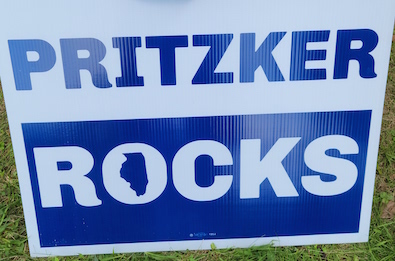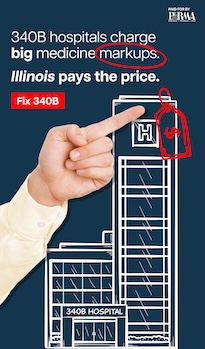* Rachel Hinton…
Depending on what a review of newly available population figures reveals, Illinois House Democrats could be asked to return to the state capital in about two weeks to make changes to legislative maps they pushed through the General Assembly in May.
“As staff continues to analyze the Census data released late last week, we are seeking to determine member availability for a return to session during the week of August 30 in the event that we decide to amend the legislative redistricting plan,” House Speaker Emanuel “Chris” Welch’s chief of staff wrote in an email to members of the House’s Democratic Caucus on Wednesday.
“Staff will be following up with you to survey your availability during that week and we will keep you updated as decisions are made on any return to Springfield,” chief of staff Tiffany Moy wrote in the email.
Welch’s team is just checking availability for a possible return, but there hasn’t been “any indication that changes are being made,” a spokeswoman for the speaker told the Sun-Times.
9 Comments  
|
* Gov. JB Pritzker held a media availability today during Governor’s Day at the Illinois State Fair. Please pardon all transcription errors and many thanks to Rachel Hinton for the audio…
Q: Governor, you do have a [Democratic] contender, possibly. Beverly Miles. She said that she’s willing to debate you. Will you debate her in the Democratic primary?
A: Well, I look forward to having the opportunity to meet her. I don’t know her. But I do want to honor her service to our country, serving in the military as she has. And I look forward to the opportunity to get to know her.
Q: What are the biggest challenges facing Democrats in this next election?
A: Look, I think, as far as I’m concerned, we’ve got a terrific record to run on, Democrats up and down the ticket. So we’ve got a lot to show people about why Democrats are better than Republicans at running the state. We’re the ones who got credit upgrades for the state. The Republicans, credit downgrades for years. We’re the ones who’ve been fighting for a woman’s right to choose, we’re the ones who’ve been working to increase mental health funding to make sure that people have a place to go when they’ve been subject to substance abuse. There’s so many things that we’ve got to do to build back up services that people lost as a result of Republicans, we’re continuing to do that. I’m excited about the fact that it is less expensive to go tuition-wise to go to college in Illinois now than it was when I took office. We’ve got more work to do there, too. So I hope everybody will know all across the state, Democrats stand for education, health care, making sure that people are safe across our state from this deadly pandemic.
Q: Are you 100 percent comfortable legally giving money to DPI now that the new committee structure is in place? Are you going to continue holding off?
A: Well, I’m excited about our Blue Wave Illinois, you know, we’re all working together to make sure we elect Democrats up and down the ticket. I did that in 2018, continued to support Democrats everywhere in our state. I’m going to do that.
Q: Are you comfortable with the Democratic Party structure? [cross-talk]
A: I haven’t looked at it. but I don’t do election law. Well, there’s an there’s an awful lot to look at. But here’s what I know. We’re all going to be supporting Democrats up and down the ticket, whether it’s DPI or it’s IDCCA, or Blue Wave Illinois, we’re all excited to get Democrats elected.
Q: Why do your own thing with Blue Wave Illinois versus supporting the party? Madigan is gone.
A: We’re going to continue to support Democrats as we have, look, lots of different committees support Republicans, we’ve got lots of committees supporting Democrats. I’m very, very happy to do my part.
Q: What’s your relationship to Congresswoman Kelly?
A: I have a great relationship with Robin Kelly. Really. We’ve known each other for a number of years now. She knows that I support many of the things that she’s done on gun safety and to lift up families across her district and across the state of Illinois.
Q: You didn’t have her here on stage.
A: She was invited. [I’m told she was there, but I didn’t see her.] Lots of people have lots of things to do. As you know, Dick Durbin’ headed back to Chicago because he was going to the visitation for Ella French, which I’ll be at later today as well. And I, you know, I’m excited about the fact that we had so many Democrats here. And the people who could make it did. I’m excited about that. Nobody’s. You know, there’s, there’s some people who try to write that, you know, people are boycotting or not going to something because they don’t want to, they don’t want to be there. The truth is that we’re all very busy. As you know, every day I’ve had about 10 events that I’ve had to attend, whether it’s here in the State Fair, or back up in Chicago. So I tried to get to everything that I can, and I support every Democrat that was at the IDCCA event this morning.
Q: COVID. What do you think of the booster? What do you think of that?
A: Well, I’m glad that the scientists have now recommended the booster, it sounds like that is the best thing. Eight months in, if you’ve been vaccinated back in December, eight months later, it’s time for you to get the booster. We’re going to make sure that that’s available to everyone in the state of Illinois, wherever you are, whether it’s at your pharmacy, your local public health department, or at your local doctor. We’ve been doing that all along making the vaccines available. Everybody should get vaccinated. And everybody that needs a booster eight months hence, which is about now, people start to get them. Please go get that.
* Meanwhile, I saw someone carrying this sign under his arm on the Director’s Lawn and did a double take, thinking it was one of those “Pritzker sucks” signs dotting the Illinois landscape. Nope…

* I told you yesterday that they moved the stage to the other side of the lawn, but it was right in the sun and most folks didn’t move up to the stage to hear the speeches and the audio system wasn’t exactly great, so, well, I missed most of what was said. I did take a pic, though…

The band was pretty good.
* Lake County Treasurer Holly Kim asked to take a pic with me, so I obliged…

* Related…
* At the Illinois State Fair, Democrats seek to portray unity and strength despite internal tensions: On Tuesday, top state Democrats met to create the fundraising panel, but both Welch and Harmon refused to take seats on it, fearing that the fundraising structure would continue to be too complicated to navigate under the federal restrictions on Kelly.
* Pritzker Campaign Clear of Transgender Ex-Staffer’s Bias Lawsuit: A transgender woman lacked triable evidence that the 2018 campaign of Illinois Gov. J.B. Pritzker (D) included her a staff layoff because of her sex, a federal judge in Chicago ruled.
15 Comments  
|
A quick programming note
Wednesday, Aug 18, 2021 - Posted by Rich Miller
* I’m heading to the Illinois State Fair for Governor’s Day. I’m taking my laptop, so I’ll likely post later this afternoon. Until then, please be extra nice to each other in comments. Thanks.
Comments Off  
|
* Marni Pyke…
Since last week, Illinois State Board of Education has put 21 school districts on probation for flouting a universal mask mandate for students ordered by Gov. J.B. Pritzker on Aug. 4 to prevent the spread of COVID-19.
“These districts confirmed that they were not complying with the universal indoor masking requirement,” ISBE spokeswoman Jaklyn Matthews said. “These districts now have the opportunity to meet with ISBE and to submit a corrective action plan to address the deficiencies that are presenting a danger to students and staff.
“School districts that do not submit an approvable plan will lose recognition status, meaning total loss of access to state funding and the inability to participate in IHSA and IESA sports.”
The districts are in Adams, Clay, Clinton, Edwards, Effingham, Franklin, Fulton, Hancock, Henderson, Jefferson, Knox, Livingston, Macon, Marion, Peoria, Randolph, Wayne and Winnebago counties. Disciplinary actions occurred between Aug. 12 and Monday. All are public school districts. […]
One other private district in Williamson County had its recognition status pulled last week but agreed on Monday to comply with mask requirements and the state is waiting for verification documents, Matthews said.
* An example from Hancock County…
The Warsaw school district has been placed on probation by the Illinois State Board of Education over not complying with mask mandates.
The School Board in June adopted a resolution making masks optional to start the 2021-22 year, and despite Gov. J.B. Pritzker’s executive order last week mandating masks indoors in the state’s pre-K-12 schools, board members have not reversed course.
School Board members “will be coming up with a plan for how to respond,” Superintendent Bob Gound said.
The district’s recognition status was lowered to “on probation,” effective Thursday, for exhibiting “deficiencies that present a health hazard or a danger to students or staff,” State Superintendent Carmen Ayala said in an emailed letter to the district, and if not corrected, “the state Board of Education may act to change the status of the district … to ‘nonrecognized.’”
87 Comments  
|
Question of the day
Wednesday, Aug 18, 2021 - Posted by Rich Miller
* I posted part of this US Rep. Rodney Davis quote this earlier today, but let’s take a closer look…
Davis said he is waiting to see what the map looks like before deciding his next political step [including a possible run for governor].
“Hold on to your seats, we’ll see what kind of political gerrymandering they put forward, and then we’ll all make decisions based upon that battlefield,” he said.
* The Question: What do you think of Davis’ response? Make sure to explain.
29 Comments  
|
* US Rep. Rodney Davis talked to Mary Ann Ahern about the governor’s race…
MAA: As new Illinois maps are redrawn after the 2020 Census. Census, Congressman Davis from downstate Taylorville, he wants to see what his district will look like. Already though he is more vocal in his criticism of Governor Pritzker.
RD: I’m excited about where 2022 is going to be for Republicans. … Once we see what the battlefield looks like. I’ve always been someone to help try to build the coalition’s that would lead us to victory.
[Pritzker TV ad excerpt]
RD: Well, he’s certainly going to need to run ads and he’s going to have to spend hundreds of millions more because he knows that he’s in terrible reelection shape. We’re going to have a Republican governor. […]
MAA: What will it take for a Republican to win in a blue state?
RD: I’m not a label person because, frankly. Somebody may think I’m too conservative and somebody might think I’m too moderate. I’m just me.
Davis said he’s been vaccinated, but opposes vax and mask mandates.
* Subscribers know the back story to this. From DPI…
In an overwhelming vote, members of the Democratic State Central Committee today affirmed Democratic Party of Illinois (DPI) Chair Robin Kelly’s proposed leadership structure for the state party.
“My vision as chair of the Democratic Party of Illinois is to bring more voices into every aspect of the party, and today’s vote puts us on a path to doing just that,” Kelly said. “I’m excited we can fully move ahead in strengthening and broadening our party across the state and electing more Democrats up and down the ballot.”
Today, members of Democratic State Central Committee (DSCC) voted to create the Building Leadership, Unity, and Equity (BLUE) Illinois Committee, open access to the party’s advisory committees to non-DSCC members, and degender the party’s bylaws.
“The votes taken today represent a new day for the Democratic Party of Illinois,” DPI Executive Director Abby Witt said. “Whether it’s the BLUE Committee, opening other committees to new and experienced voices outside of our official structure, or making sure our rules are as inclusive as possible, the message from our Chair and our members is aligned and clear: this is a party for everyone. Illinois Democrats, welcome home.”
The BLUE Committee, in compliance with the affirmative advisory opinion from the FEC last month, is made up entirely of non-federal office holders not appointed by the chair, and will be dedicated to managing the party’s non-federal account. Voting members of the BLUE Committee are State Central Committee members Bill Houlihan, Carol Ronen, and Ald. Silvana Tabares.
“The majorities we hold as Democrats are going to be tested this cycle, and I’m excited to join Carol and Silvana in this new effort to keep Illinois blue in 2022 and beyond,” Houlihan said. “The BLUE Committee has an important role to play in building an enthusiastic coalition of Democrats across Illinois.”
“2022 is a pivotal redistricting year, and all of our local candidates will run in newly drawn districts,” Ronen said. “Our goal is to grow our majorities in the general assembly and make sure Democrats win the Illinois Supreme Court races. The BLUE committee will help to bring the necessary resources to win these races and ensure Democratic values prevail. I’m honored to be part of this effort.”
“The best way to continue to grow our party, attract voters and win elections is by expanding our statewide coalition of Democrats,” Tabares said. “I’m proud to be a part of a new way the party will achieve that.”
Not one Black person is on that BLUE Committee.
* This did not happen today…
Watch for the news this morning at the County Chairs’ Brunch on the Crowne Plaza grounds in Springfield. More than 800 Democrats will be in attendance and 400 more will view online, according to McHenry County Democratic Party Chair Kristina Zahorik.
Sen. Dick Durbin is expected to announce that Nikki Budzinski will challenge Republican Rep. Rodney Davis in the 13th Congressional District.
Budzinski recently left the Biden administration last month, where she was chief of staff in the Office of Management & Budget. Before that she worked for Gov. J.B. Pritzker’s administration. […]
Durbin talked about Budzinski’s move Tuesday during a private party in Springfield leading up to today’s festivities. […]
What’s curious: Durbin specifically said Budzinski would run against Davis in the 13th District, which suggests the veteran Republican congressman will be safe in the remap. If that’s true, then one of the four other Republican representatives would be edged out as lawmakers redraw congressional districts to align with the state’s population decline.
There was never any plan to make this announcement, I was told early this morning. Not to mention that we have no idea yet what Davis’ new district will look like. Also, nice job by Durbin of stepping on Nikki’s eventual announcement. /s
*** UPDATE *** The Tribune ran a story last year on Supreme Court Justice Tom Kilbride’s retention bid…
Billionaire conservatives, state GOP leaders and a dark money group are blanketing voters’ mailboxes with full-color attack ads that portray the justice as a Madigan puppet, citing the speaker’s large campaign contributions to Kilbride’s election efforts dating back to 2000. […]
James Nowlan, a former GOP lawmaker who chairs the anti-Kilbride committee Citizens for Judicial Fairness, asks political audiences in towns such as Carthage, Monmouth and Utica if they ever wished they could vote against Madigan. […]
A $200,000 donation from a dark-money group called the Judicial Fairness Project gave the anti-Kilbride forces a jump-start. The group’s registered agent is attorney John Fogarty, the Chicago-based general counsel for the Illinois Republican Party. Fogarty declined to identify the donors.
Paperwork filed with the secretary of state showed the group’s board of directors includes two members of the Republican state central committee and the former head of the Illinois Republican County Chairmen’s Association. Listed as the incorporator was Nick Klitzing, a former state GOP executive director. [Emphasis added.]
* I mention this because I just got an email from the Judicial Fairness Project…
Friend,
You were recently emailed about a petition to clean up Illinois’ courts.
Will you take a moment to add your name to DEMAND that we clean up Illinois’s famously corrupt justice system?
ADD YOUR NAME – 30-SECOND PETITION SIGNUP
We all know that Illinois has a reputation for corruption and crime. It goes all the way to the top, unfortunately – Illinois currently has a 4-3 partisan majority on the Supreme Court, and next year’s election threatens to shake up the balance of power in our state…
So the Legislature and Governor Pritzker jammed through a new, hand-drawn judicial map so they could protect themselves!!
That’s not all.
Last year, an incredible and shocking $10 million was spent on the retention race for the Supreme Court, and there’s much more coming next year with more judgeships on the ballot.
What will YOU chip in to bring fairness back to our courts – $10 million of your money??
How about just $10?
How about just $20?
Other amount
Money. Hand-Drawn Judge Protection Maps. Corruption in the courts.
We deserve better. Will you join us?
…Adding… Also…
* Related…
* Democratic priorities benefiting working families to be highlighted at Governor’s Day rally
* Illinois State Fair 2021 set to kickoff political primary season: For Democrats, the big political race will be among the four declared candidates vying to replace Jesse White, who is not running for another term as Secretary of State.
23 Comments  
|
* From Ed McManus…
The director of Choate Developmental Center in far downstate Anna, indicted in June for misconduct in connection with workers’ attacks on residents with disabilities, is being sued by an employee for violating the State’s Whistleblower Protection Act.
Darcie Hancock, a former residential services supervisor at Choate, charged that [now-former] director Bryant Davis retaliated against her after she told the institution’s internal affairs office that she believed Davis received money from the State “to which he was not entitled.”
Teresa Smith, a former assistant director of the facility who was indicted along with Davis, was also named in the whistleblower suit. Hancock said she reported to Smith that she believed a member of the Choate management team was falsifying timesheets, claiming hours she did not work, but Smith took no action to investigate the allegation.
It was reported in March that a total of 9 Choate workers had been indicted during 2020 in connection with attacks on residents. Davis, Smith and another administrator were charged in June with “impeding a State Police investigation of a staff member battering an individual.”
The lawsuit was filed in 2018 but was put on hold when the pandemic began. Hancock’s attorney, James P. Baker of Springfield, said he is now in the process of beginning discovery.
Hancock worked for 22 years at Choate, which is one of seven large Illinois institutions serving individuals with intellectual and developmental disabilities.
‘THREATENING AND ABUSIVE TREATMENT’
Hancock said after her allegations about Davis and the member of the management team, Davis and Smith repeatedly subjected her over the next three years to unwarranted investigations, disciplinary actions and suspensions. At one point, she was assigned to the dietary office for five months and “subjected to threatening and abusive treatment by the supervisor.”
And in August of 2016 she was “without good cause” assigned to do cleaning work “in the basement of a building in an environment which was filthy, was contaminated with asbestos and had no air conditioning.”
The suit alleges that as a result of all this, Hancock “developed emotional symptoms which required her to take a disability leave” beginning in May 2017. She has not had a job since then.
The suit accuses Davis, Smith and the Dept. of Human Services of retaliating against Hancock for disclosing wrongdoing, which is prohibited by the whistleblower act. It says she “sustained physical and emotional stress and anguish as well as the loss of enjoyment of life.” The suit asks for damages for the loss of salary and benefits, as well as compensatory and liquidated damages.
The Attorney General’s Office filed an answer to the suit, denying most of the allegations. But the office stated that they “lack knowledge or information sufficient to form a belief about the truth of the allegations” that Davis received money from the State to which he was not entitled and that a member of the management team falsified timesheets.
Following the June indictments, DHS initially announced that the three administrators would remain on the job while their court cases proceeded. Much criticism followed; State’s Atty. Tyler Tripp told a newspaper it was “asinine” not to put them on leave. A week later DHS reversed itself and announced that the three were “being reassigned from the facility.”
Smith ‘s attorney has filed a motion to dismiss the indictment. All three administrators are awaiting assignment of a judge to hear their cases.
The lawsuit is here. The state’s response, in which it denies violation of the whistleblower statute, is here. The state also denied that Hancock’s work product was satisfactory or that she regularly received satisfactory performance reviews. It also denies that no action was taken after Hancock made her allegations.
* Related…
* Choate employees facing charges have been reassigned
1 Comment  
|
* SJ-R…
Landrey Freeman of Winchester proclaimed it “the best experience of her life.”
Her mother, Jessica Freeman, “couldn’t believe the numbers that were coming out of the auctioneer’s mouth.”
When the dust cleared on the Governor’s Sale of Champions Tuesday at the Coliseum of Champions at the Illinois State Fair, Landrey Freeman’s Grand Champion Steer had fetched a record $105,000 bid from Illinois First Lady MK Pritzker.
She outbid another Pritzker — namely Gov. JB Pritzker — much like she did at the 2019 State Fair.
Landrey gets half of the final bid. The previous record was set by then-Gov. Bruce Rauner.
* Pics…
More pics here.
20 Comments  
|
* Tribune…
Amid rising COVID-19 public infection rates, the low rate of vaccinations among workers at nursing homes is raising concerns about a potential resurgence of the virus among vulnerable residents and prompting calls for mandated inoculations.
While 80% of residents of long-term care facilities in Illinois have been vaccinated, only 60% of workers have, according to federal data. […]
Like many hospitals and health systems, some nursing homes now are requiring employees to get vaccinated. Industry giants Brookdale Senior Living and Genesis Healthcare Inc., and some downstate facilities have announced mandates.
The Illinois Health Care Association, which represents about 485 facilities, would support a statewide mandate, Executive Director Matt Hartman said. […]
SEIU Healthcare Illinois, which represents many nursing home workers and has promoted voluntary vaccinations, did not immediately respond to requests for comment.
* Meanwhile, keep this in mind when you read news stories based on case-counts alone…
After Chicago began averaging more than 400 daily new cases of COVID-19 this week, the city’s public health officials announced the indoor mask requirement will be reinstituted starting Friday.
“We may need to put further restrictions in place, but different from last year, a high case count does not automatically translate to high hospitalizations and a high death count,” Dr. Allison Arwady, head of Chicago’s public health department, said Tuesday.
The Cook County Department of Public Health said it’s considering a mask mandate, too. The department oversees health policy for the Cook County suburbs. Suburban Cook County is averaging 446 new cases of the virus a day, according to Illinois Department of Public Health figures.
Why is it different from last year? The vaccine. 54 percent of Chicago residents are vaccinated and 57.5 percent of suburban Cook County residents are vaxed. That helps a lot, but it’s not nearly enough.
Get your shots, people.
* Related…
* As Schools Reopen, Vaccination Rates Among Teenagers Range From One Extreme To The Other
* Texas school district makes masks part of dress code to get around Gov. Abbott’s order
17 Comments  
|
* Subscribers know more about the negotiations and the possible return to Springfield. Here’s WTTW…
Illinois legislators may be back in Springfield soon for another summer special session, to try once again to pass a massive energy package that thus far has proven elusive.
The result – be it passage of a new law, or a continued stalemate — will impact everything from Illinois’ role in climate change to your energy bill. […]
“This particular plant [in Byron] has a fixed amount of fuel loaded in it and that was loaded 18 months ago,” said Exelon Executive Vice President and Chief Generation Officer Bryan Hanson. “That fuel is losing energy. In fact I think in the next couple of days we’ll start to see the reactor lose its power, from 100% power it will slowly trickle down to about 70% power, then the plant shuts down on Sept. 13.” […]
“Until we submit that letter to permanently defuel operations, we can reverse but reversing a decision like we’re mad is like turning a cruise ship around,” Hanson said.
He says once the letter to decommission is submitted – once the fuel rod’s removed – Byron is closed. Forever.
Thoughts?
36 Comments  
|
Another day, another lawsuit
Wednesday, Aug 18, 2021 - Posted by Rich Miller
* Tom Schuba…
Two firms vying for lucrative pot shop permits filed suit Monday in Cook County court claiming state officials wrongfully pushed them to give up additional spots in this week’s third and final licensing lottery.
The complaint, brought by Suite Greens LLC and So Baked Too LLC, doesn’t seek to upend the licensing rollout, like another pending suit in Cook County is trying to do. Instead, the applicant groups want the state to give them all the chances they initially earned in Thursday’s long-delayed drawing.
“It doesn’t make sense how they can delay a year and a half and come back more incompetent than when we started,” said Britteney Kapri, a renowned poet from Uptown who’s partnered in So Baked Too. “The whole process has just been so confusing and aggravating the whole time.”
Indeed, the business of dishing out the lucrative permits has grown increasingly convoluted.
Indeed.
Go read the rest.
4 Comments  
|
|
Comments Off  
|
|
 Support CapitolFax.com
Support CapitolFax.com
Visit our advertisers...
  ...............
...............
 ...............
...............
 ...............
...............
 ...............
...............


|
   
|
Hosted by MCS |
SUBSCRIBE to Capitol Fax |
Advertise Here |
Mobile Version |
Contact Rich Miller
|
















